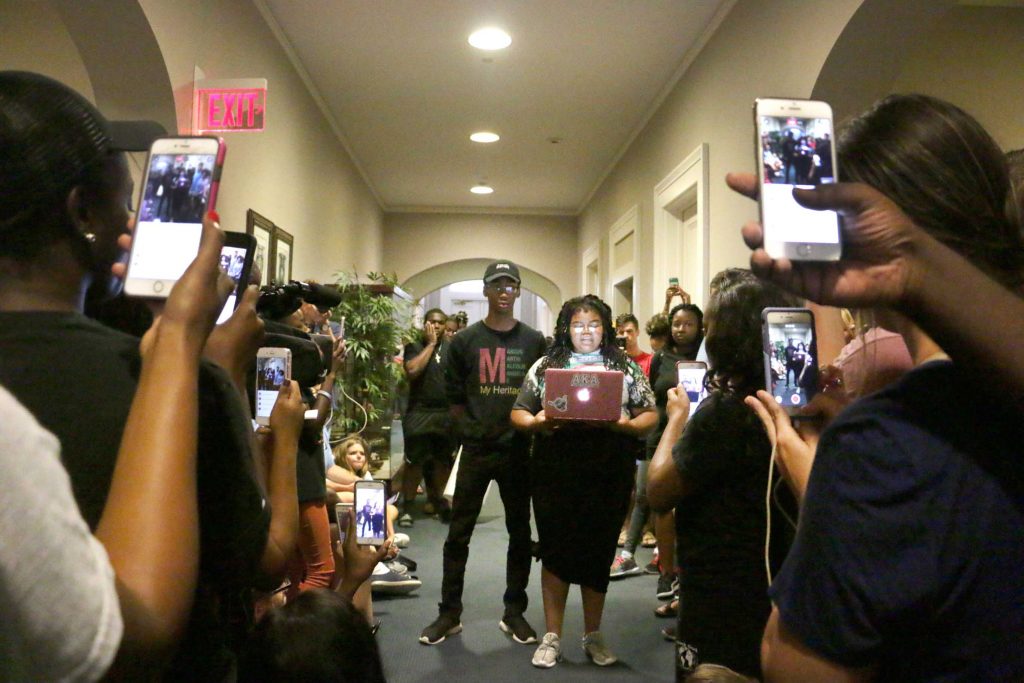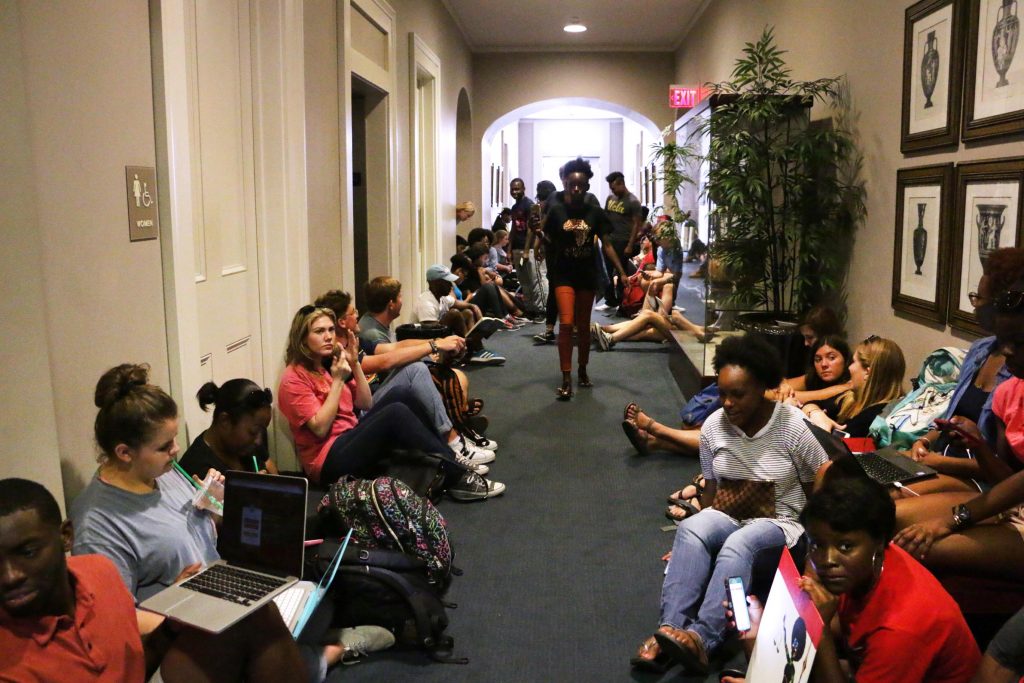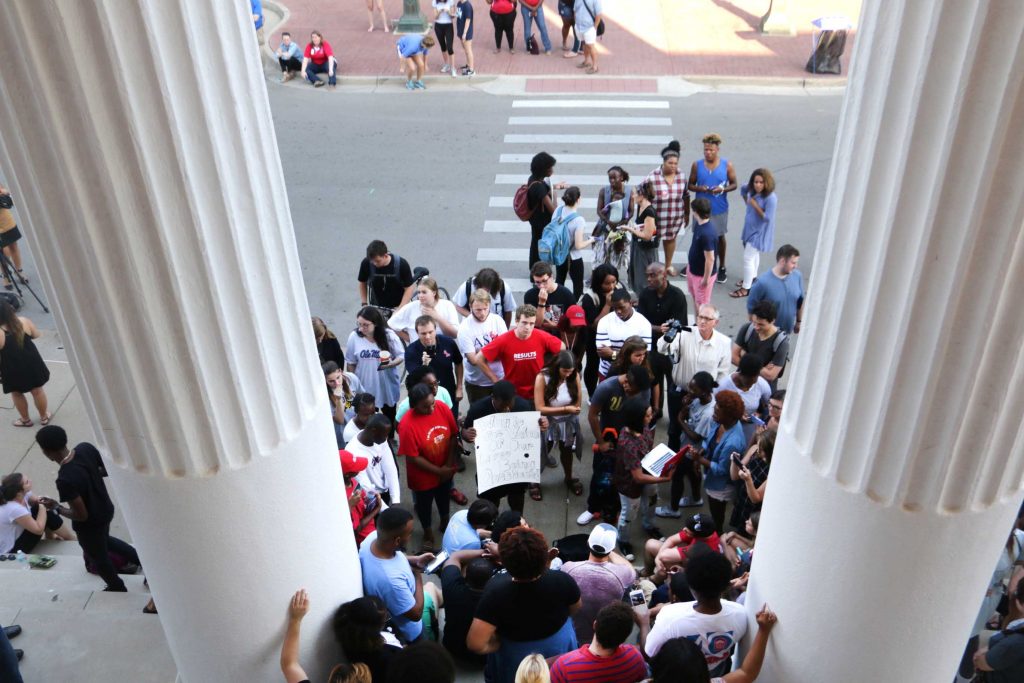Almost exactly two years ago, a white man connected to the university made a racist Facebook post that garnered national attention and sparked conversation on campus. A few weeks ago, history repeated itself.
Ed Meek, namesake of the Meek School of Journalism and New Media and former assistant vice chancellor of public relations for the university, made an offensive Facebook post on Sept. 19 attached to photos of two black women on the Square.

Students gather outside of the Chancellor’s office for the peaceful occupation held by UM NAACP. File photo by Ariel Cobbert
“Enough, Oxford and Ole Miss leaders, get on top of this before it is too late. A 3 percent decline in enrollment is nothing compared to what we will see if this continues…and real estate values will plummet as will tax revenue. We all share in the responsibility to protect the values we hold dear that have made Oxford and Ole Miss known nationally,” the post read.
Within four hours of the post’s publication, Meek’s words had collected more than 500 comments and 600 shares, one of those comments coming from Chancellor Jeffrey Vitter’s Facebook account.
Since then, many classroom conversations have been dominated by topics related to racism at the university, echoing reactions similar to ones that inspired the Occupy the Lyceum movement two years ago.
On Sept. 23, 2016, more than 100 students clogged the hallways of the building in the heart of campus, the Lyceum, standing in solidarity against a Facebook comment made the night before by former Ole Miss student Jordan Samson.
“I have a tree with room for all of them if you want to settle this Wild West style,” Samson said on a post about the Charlotte riots in response to the death of Keith Lamont Scott, who was fatally shot by police officers.
The next day, students from different organizations on campus organized at the Lyceum in response to Samson’s comment as well as what many felt was a neutral statement from university administration.
“A lot of people felt that (Samson’s) comment really embodied the lack of safety for students of color on campus,” then-president of the UM NAACP Tysianna Marino said. “And then when the administration, particularly Chancellor Vitter, published their statement, that’s when we decided to respond because we felt like it was a clear indication that keeping the peace was more important than protecting the lives of students of color from these very real threats that were being made on us.”

Almost 100 students lined the halls of the Lyceum outside of the Chancellor’s office. The peaceful occupation was originally planned by the UM NAACP in response to the Chancellor’s original statement Friday in reaction to students making racist remarks on social media. File photo by Ariel Cobbert
Organizers of the protest including Dominique Scott, Makala McNeil, Allen Coon and Jaylon Martin, as well as other student leaders, came up with a list of demands for the university.
These four demands called for a stronger response from the administration: that the university recognize Samson’s comments as a racist threat and take disciplinary action; that the administration apologize for its previous statement because it did not recognize this racism; that Vitter reassure the community that neither he nor the university will tolerate this type of behavior on the Ole Miss campus; and that Vitter would work directly with students to confront the culture of white supremacy on campus.
These requests were then announced and the movement’s leaders, along with university administrators met privately in the Lyceum for more than two hours.
This meeting led to another, more strongly-worded statement from Vitter, in which he condemned Samson’s post. However, in comments made to The Daily Mississippian, student leaders still felt there was much to be accomplished, and not all of their demands were met.
“The fight will always continue,” then-communications director for the UM NAACP Makala McNeil said.
Two years later, it has.
Former leaders of the Occupy the Lyceum movement were not surprised by the racist message implied by Ed Meek’s comments.
“This is white people doing what white people do… being offended at the freedom of the life and autonomy of black people, which is historically not new,” then-treasurer of the UM NAACP and president of Students Against Social Injustice Dominique Scott said. “This is old dog-whistle racism.”
Though Marino applauded the swiftness with which the university has moved forward with the name change of the Meek School, she questioned the administration’s motives.
“I think that the university definitely acted more quickly this time, but I think they acted for the very same reasons that they did when Occupy happened, when the camera lens was aimed at them and the world watching,” she said. “I think that this university time and time again continues to show that things have to get tremendously bad before they do anything to rectify and fix it. There’s clearly this toxic, racist atmosphere that exists on campus.”
Former ASB President Austin Powell, who attended the Occupy the Lyceum protest, said the university administration must address that atmosphere in order to make a change.
“It’s not a grand gesture to say that racism is wrong,” he said. “We need more accountability.”
Marino said student organizations should play a role in “forcing the administration’s hand.”
“Everybody has to be willing to take responsibility for the part that they play in (the racist atmosphere on campus.) Even the university plays a very important part of the perpetuation of racism on campus, a very vital part,” she said. “If we’re holding ourselves to the highest esteem, the university is going to be better. The chancellor is going to be better, because he knows he has to step up. And honestly, all that power lies in the hands of the students.”

Students have civil dialogue with Andrew Soper, previous ASB Senator, and sponsor of Our State Flag Foundation on the steps of the Lyceum after several students voice their concern about him being in the Lyceum during the sit-in. File photo by Ariel Cobbert
Marino also commended the university for proactive measures to fight the culture of racism on campus, like adding a vice chancellor for diversity and inclusion, but still feels as though the university falls short in affecting actual change. Scott agreed, saying that the Meek name change process only passed through university administration quickly because it’s “easy,” and not the “elbow grease work” that is required to change the culture of the University of Mississippi campus.
“I never ever will believe that anything is done because the University of Mississippi is progressive, because it’s not. I feel like this was done because it was easy. It’s not hard to change the name on a building, especially after the person said that they wanted their name off,” she said. “You’re not transforming the university. That’s not racial reconciliation work. I know that it’s not reparative justice work. That’s housekeeping to me.”
University administration declined to respond to questions regarding Occupy the Lyceum.






